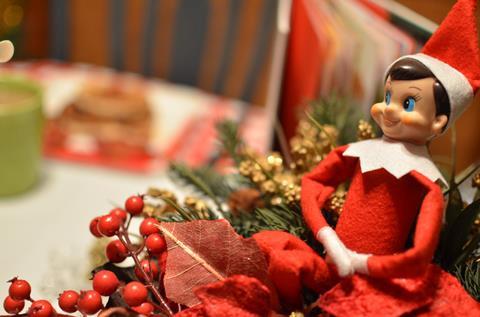Christmas is about the undeserved gift of Jesus, says Mark Deacon, not giving gifts to an elf so he doesn’t ’report’ you to Santa. As secular ideas capture hearts at advent, it’s time for churches to fight back

I have a dream. It’s 50 years from now, some time in November, and the church leaders are meeting to plan Christmas.
“So, when are we doing The Booting of The Elf?”
“Ah that’s so important. Traditional y’know; starts Advent proper. Last year Rev Corker set a whole new clergy record. It was inspired.”
“I see the Baptist youth group are being sponsored for each metre they can boot their elf…”
It’s a dream which I, for one, would love to turn into reality right now. Let me explain.
The legend of the elf
Each year, I note with horror the arrival on the Christmas scene of The Elf on the Shelf. This mendacious little homunculus seems to be building a legend whereby he arrives in advent and grasses us up to Santa should we do anything that puts us on the naughty list.
The elf is subverting Christmas. Unconditional love becomes earned love
And just like Santa, there is a whole framework of (rather strange) beliefs growing up around this dreadful little person. I guess that the foundations of Elfism, for the elf fundamentalists, are a combination of the lyrics of ‘Santa Claus is coming to town’ - “He’s making a list and checking it twice / Going to find out whose naughty or nice” - and the delightful antics of Will Farrell. This may come as a shock to some: the film Elf is not a documentary.
Sacrificial giving
This rather nasty piece of behaviourist mythology has taken a bizarre turn this year. The elf is no longer the passive spy, reporting our misdemeanours back to Santa, but now needs to be appeased in his own right. My local shops are selling clothes and gifts for your elf on his shelf. Santa’s spy has become a demi-god demanding sacrifice – which, of course, comes with a price tag.
This is the work of a marketing genius. Through some delicate manipulation of ideas in film and song they have developed guilt, anxiety and fear in parents and children alike. All of which can be assuaged by spending money.
An unconditional gift
It would be funny if it weren’t serious. The elf is subverting Christmas. Unconditional love now becomes earned love. That is not love, it’s wages. Gifts given at Christmas are a model of God’s love. As the hymn ‘My song is love unknown’ says: “Love to the loveless shown, that we might lovely be.”
The baby in the manger is the ultimate gift, reconciling God and sinners. Salvation is not earned; it is a gift to be accepted. There is enough fakery and flummery around Christmas, most of which can be used to make gospel points, but the elf has no redeeming features. It is time for Christians to draw a line in the snow.
Santa’s spy has become a demi-god demanding sacrific
I therefore propose a new advent tradition: The Booting of The Elf. On the first Sunday of Advent, churches gather and, as solemnly as Jonny Wilkinson getting ready to take a penalty kick, place an elf on the chancel steps, the edge of the pulpit or the side of a baptistry. The pastor, vicar or elder then takes a big run up and kicks it as hard as they possibly can. Or perhaps church youth groups could hold a sponsored ‘boot the elf’ competition, with all proceeds going to the local food bank, or other fine charities where unconditional love still shines forth.
This way we can have some fun, raise money for something good, our meeting can move onto discussing the coffee rota and, most of all, we will reclaim the unconditional love of Christmas.
Are you with me?



































3 Readers' comments